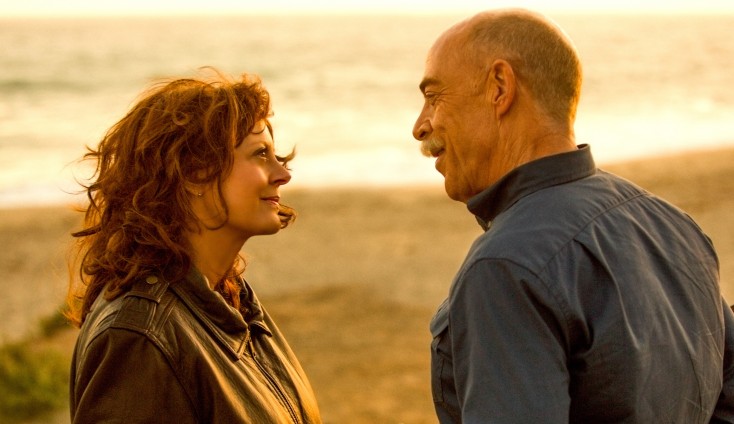
(l-r) Susan Sarandon as Marnie Minervini and Rose Byrne as Lori Minervini in THE MEDDLER. ©Sony Pictures Classics. CR: Jaimie Trueblood.
By ANGELA DAWSON
Front Row Features
HOLLYWOOD—Susan Sarandon is notable not only for her long and illustrious acting career but also for being opinionated and frequently outspoken on social and political issues.
The 69-year-old Oscar winner recently caused a public stir when she suggested that GOP presidential candidate Donald Trump might be “better for America” than Democratic candidate Hillary Clinton. A staunch supporter of Democratic candidate Bernie Sanders, Sarandon quickly clarified her remark by explaining that a Trump presidency might inspire a revolution instead of ensuring the status quo under a Clinton presidency on matters like a militarized police force, privatized prisons and the death penalty.
Arriving for an interview with her left foot in a brace, she explains she slipped while hiking in Colombia with her teenage son Jack Henry (with former actor/director partner Tim Robbins) after attending the Cartagena Film Festival, where there was a retrospective of her career.
“I paid such good attention for the first hour and a half when it was very tricky, and then at the very bottom when the worst was over of course I just didn’t pay attention,” the redheaded beauty explains. “The next thing I knew I was on my knees and I had fractured my ankle.”
Sarandon stars in the comedy “The Meddler,” in which she plays a widow who can’t help but insert herself into her only daughter’s business. Daughter Lori (Rose Byrne) is a Hollywood screenwriter, who resents her mom’s constant interference, and tries some subtle—and not so subtle—ways of telling her to get a life. While Lori is out of town, Sarandon heaps her largesse on Lori’s friends and strangers alike. She meets Zipper, a former cop turned movie set security guard (Oscar winner J.K. Simmons) and slowly begins to let her well-constructed emotional guard down. In a less capable actress’ hands, Marnie might come across as annoying but Sarandon gives writer/director Lorene Scafaria’s character an endearing quality that audiences are likely to embrace. She also stars in the upcoming drama “Mothers and Daughters” with Sharon Stone and Christina Ricci.
Q: You’re a mother of three. Have you ever been accused by your children of being a meddler?
Sarandon: The secret to being a mother is just to do it from the very beginning so they think that’s normal. I definitely do, and they meddle back. It’s a mutual meddling thing. I do not show up with bagels constantly (as Marnie does in the movie) but I do send things constantly, and I text. They don’t take my phone calls so I text and I send videos and music, and they do the same thing. But I’m a big believer in making mistakes, so I encourage my kids to fail constantly, so they understand that they can come back. I always assume that they’ll get back up and if they ask me for advice I give it, but that doesn’t happen too often.
Q: How exciting is it for you to have a romantic leading part in your late 60s? Not too many films of them are produced with mature actors in leading roles, and here you and J.K. have sparks of romance.
Sarandon: Every film I’ve ever done, no matter who the other people are, has been a love story because, for me, the bravest thing, the most moving thing anybody can do is decide to make contact with another person, and be intimate with them not even sexually but just to be seen. I think that makes you so vulnerable and so when I go to the movies, I want to root for that contact. Whether, when I did “The Client,” it was with a kid or if it’s with another woman, it doesn’t really matter. It’s just that moment of deciding that you’re going to be vulnerable to another human being. I think they’re all in that situation.
J.K. is so solid and I just feel like you just know if ever she’s going to surrender to somebody, he’s going to make her feel safe. He brings this confidence and you don’t feel that he’s going to push her or anything, that he’s just there and sexy and just, “It’s OK. I’m just there and whatever you want,” and that’s really rare. I think that’s what is so compelling about that story is that you see that you root for her to finally take his hand, and that’s as big a thing as taking off your clothes really, when you make that gesture. But in any film and any age of anybody I think that’s what reads as chemistry in a movie, is when you think two people are actually seeing each other and seeing each other in a way that nobody else sees. I think you root for that because everybody wants to have contact with somebody. That’s really what our tribe is about, is always looking to make contact.
Q: Marnie is very generous with money. Having been a successful movie star, how do you sort of police yourself?
Sarandon: Who cares as long as you’re helping people what the reason is? I don’t judge it. My business manager puts his foot down. That’s what stops me. But I think you investigate. I was the oldest of nine kids and when I did start to get money, I had to learn when to interfere, and when to let people (fend for themselves). Even with my kids, I remember my son saying, “Having an allowance and having to do this makes me so tense, mom.” Eventually, he had to start paying for things and figuring out how to work it, so you don’t want to take that away from people. When you’re helping people do things that they should do for themselves. But I don’t think you can be too generous. I say err on the side of generosity anytime; there’s enough mean people in the world.
Q: Did winning the Oscar for your performance in 1995’s “Dead Man Walking” impact your career? Did you get more lucrative roles afterwards?
Sarandon: No. I think when you’re Jennifer Lawrence, who got her first nomination for “Winter’s Bone,” when she was still an unknown, it makes a difference. Or if you are Halle Berry, who was a Bond girl and then she did a serious, dramatic role (in “Monster’s Ball”) and she gets a nomination, that really wakes people up and changes the way they see you. But when you’ve been in the business for almost 50 years or something, it’s great because they see the bottom half of your (Oscar) dress finally. You get to get out of your seat. Instead of saying, “Four-time loser “ they say “Academy Award winner,” but it didn’t really change anything for me. I’m not knocking it, but it had been a lot of nominations in a short period of time, and I think everybody was just like, “Argh, give it to her now. Jesus.”
Q: What was the most important thing for you when it came to inhabiting Marnie in this film?
Sarandon: For the tone of the film, it was really important that everything be approached as in reality and real and I didn’t want to wink at the audience or patronize the audience or patronize her. I think that it was so well written, and there’s nothing funnier than desperation, so if you just trust that and commit to it. I basically just wanted to make sure that she was real and not trying to play the comedy and just trust that there was enough going on there, and then just really be as open as possible and surrender to that. I think as much as she is afraid of certain things that her heart is very open, even when she doesn’t know someone’s last name. It was important to try to stay in that state and I wanted to make sure that I didn’t think she was funny. I think she’s really sincere.
Q: You’ve been single for a few years now after being in a long-term relationship. Do you still believe in romance?
Sarandon: Oh yeah. Unfortunately, yeah. That’s why Sundays are so miserable. I go out and I see everyone looks like they’re in love and I just hate them for it. I’m very romantic. I’m even romantic about my grandchildren. I mean I just am, yeah, I am. I don’t miss a person from an old relationship but unfortunately my brain remembers the being in love part and I miss that part. I don’t necessarily miss them, but I do miss that part. I do like that. I’m really good at it, and I miss not being able to have someone to do that kind of stuff with, but, you know. It could happen (again). I just have to look for my Zipper.
There’s a book about how men love (expletive). Someone gave it to me to stop me from being so giving. It says you really can’t be too doting. From every single chapter I read, it was clear I’d done everything wrong so far.
Q: Is that something you aspire to now? To become a (expletive)?
Sarandon: I’m still reading (the book). On the other hand, I’m a sucker for possibility so I’m always thinking, “Ah, this guy’s alright. Yeah, he’ll straighten up.”





